|
Antarctica's "garbage man"
Antarctica's "garbage man" Hatcher works for the Englewood, Colo.-based Antarctic Support Associates, a non-profit organization under contract to the National Science Foundation. In addition to removing 500,000 pounds of hazardous waste and 4 million pounds of non-hazardous waste from McMurdo Station each year, Hatcher's company constructs buildings at the station, delivers fuel and food, and provides support staff members, such as professional chefs. Hatcher's team only visits Antarctica during the austral summer season from October to February, when the weather is comparatively mild. "At 30 degrees," he says, "we're playing Frisbee in our t-shirts." Back to Contents Alumna brushes up on her Shakespeare In addition to being the first woman ever to portray Richard III in a Shakespearean work, Norris also played Helena in A Midsummer Night's Dream and Mistress Quickly in Henry IV, Part I. She is currently one of four people--one male and three females--playing Hamlet in an experimental production of that play at the Folger Theatre in Washington, D.C.Back to Contents Special Olympics gives another victory to Herbster During Herbster's first years at Tech, Special Olympics held basketball competitions at War Memorial Gym. "We [basketball team members] were encouraged to volunteer, so a good majority went over," Herbster says. "It was a lot of fun." Even after Herbster's playing days at Tech ended, Special Olympics kept popping up. He was the university contact with Special Olympics when he worked at both North Dakota State University and Pittsburg State University in Kansas. He learned the intricacies of working with volunteers, tending to the needs of the athletes, and preparing the necessary facilities. In 1998, his career took a new direction. He now oversees the Special Olympics program for the southern half of Minnesota. "It's better than a 9-to-5 job," he says. It's also more than a 9-to-5 job for Herbster. He volunteers his own time to train three powerlifters, and this past summer he took a powerlifting team to the World Summer Games in North Carolina. His three athletes came home with one gold medal, six silvers, one bronze, and two fourth-place finishes. It was better than beating Georgetown in basketball. "Sometimes it is easy to take for granted your own physical abilities and gifts, but the accomplishments of these athletes dwarf whatever I was able to do on the basketball court," Herbster says. Back to Contents Expert investigates Kennedy crash Clarke, who has examined wreckage from the Pan Am Flight 103 over Lockerbie, Scotland, and other highly publicized disasters, has appeared on NBC's "Today," "Larry King Live," "McNeil-Lehrer Hour," and the CBS Evening News. His popularity, he says, is due to the lack of restrictions expert investigators have when talking to the media. Crashes are always investigated by the National Transportation Safety Board (NTSB), Clarke says, but no one from that body can talk freely to the media or conjecture on causes of crashes until an official NTSB report is released, often several months after the accident. Investigators like Clarke, hired by law firms representing victims families, pilots' unions, or airplane manufacturers, can speak to the media at will. "We're often much more thorough than the NTSB," Clarke says. "We might have six to eight experts going over a crash, where the board has one." Clarke has been making national television appearances since be began his crash investigation firm part time in 1981. Back to Contents
Qudais, who had been a school principal before coming to Tech, began building the Hashemite University in Jordan with Mohammed Hamdan, who had been a visiting faculty member in Tech's statistics department. Hamdan became the first president of the university. Within six months, Hashemite University had two buildings ready, and classes began in September 1995 with 650 students in 17 departments in the colleges of science and art, economics, and education. Qudais was the dean of student affairs until 1998, when he became a faculty member in Hashemite's College of Education. He returned to Virginia Tech last summer to collaborate on research on student learning assessment and student affairs. He is interested in starting other joint projects between Hashemite University and Tech. The value of a college education is clear to everyone, Qudais says. "All parents in Jordan want their sons and daughters to be university graduates in spite of the high unemployment," he says. "Most graduate students still have to go abroad, and there are many graduates of U.S. universities on the faculty at Jordan colleges and universities." Back to Contents
Finn was aware of the Society for Design Administration's CANstruction competition, in which teams of architects have six hours to build structures entirely out of canned food. After the competition, food is delivered to food banks. Finn took on the task of organizing Atlanta's first CANstruction competition. "It took nearly an entire year to organize it," Finn says. She persuaded 10 architecture firms to participate and started an annual event that will continue to benefit Atlanta food banks. Back to Contents
Chris Colston (marketing '81), John Hunt (communications '89), John Nunnally (communications '90), and Steve Howard (physical education '91) write nationally-known columns about rotisserie sports leagues, also called fantasy leagues. In rotisserie sports, participants organize as a league and build teams by pretending to buy real professional ballplayers. The actual statistics of each player determines whose team wins. Hunt, a former sports editor for the Collegiate Times, has been writing a rotisserie baseball column for Baseball Weekly since 1993. Colston, the former editor of the Hokie Huddler, writes a basketball column called the "Rotisserie Chicken" for USAToday.com. He is currently the assistant operations editor for Baseball Weekly, a position he took over from Hunt. Nunnally, also a former Collegiate Times sports editor, writes about baseball in the "Roto Roost." Howard worked for Colston at the Huddler for a stint and now covers football in the "Pig Skinny." Both work for USAToday, as well. Back to Contents Changing the way to watch online His MediaChannel, a website that offers links to hundreds of video sites, downloads of viewing software, and even a virtual mall, was named Hot Site of the Day by USA Today.com. early in the year. The industry on line magazine, DB&P Webcast Track, cited MediaChannel among 10 sites that could "generate a lot of investment enthusiasm as this market begins to mature and user bases solidify." As bandwidth increases and computer networks accommodate ever-faster data transfer, video's popularity will increase rapidly, Fairfax says, and MediaChannel is poised to capitalize. "We think the Web is going to be more and more video-based, just as video has been in the rest of the telecommunications industry," he says. Back to Contents Alumni flies again Home | News | Features | Philanthropy | Athletics | Alumni | Classnotes | Editor's Page |
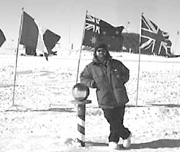
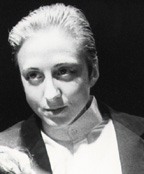



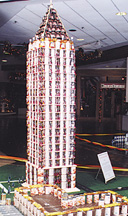
 Thanks to the efforts of Colleen Finn (architecture '92), hundreds of people in need in the Atlanta area had food available. Finn organized a competition for architects in metropolitan Atlanta last November that netted six tons of food for Georgia human service agencies and food banks.
Thanks to the efforts of Colleen Finn (architecture '92), hundreds of people in need in the Atlanta area had food available. Finn organized a competition for architects in metropolitan Atlanta last November that netted six tons of food for Georgia human service agencies and food banks. 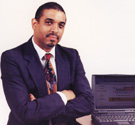
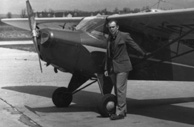 Forty-nine years ago, Cadet Frank Hargrove (business '51) flew his Taylorcraft over Virginia Military Institute, bombing Tech's chief rival with bags of flour and leaflets before the teams faced off on the football field. Recently, Hargrove, now a state delegate in the Richmond area, flew back to the Virginia Tech airport in the same plane. He'd bought back the aircraft several years ago, after selling it for $700 in 1954. "To find it in restorable condition was truly a thrill," he says.
Forty-nine years ago, Cadet Frank Hargrove (business '51) flew his Taylorcraft over Virginia Military Institute, bombing Tech's chief rival with bags of flour and leaflets before the teams faced off on the football field. Recently, Hargrove, now a state delegate in the Richmond area, flew back to the Virginia Tech airport in the same plane. He'd bought back the aircraft several years ago, after selling it for $700 in 1954. "To find it in restorable condition was truly a thrill," he says.